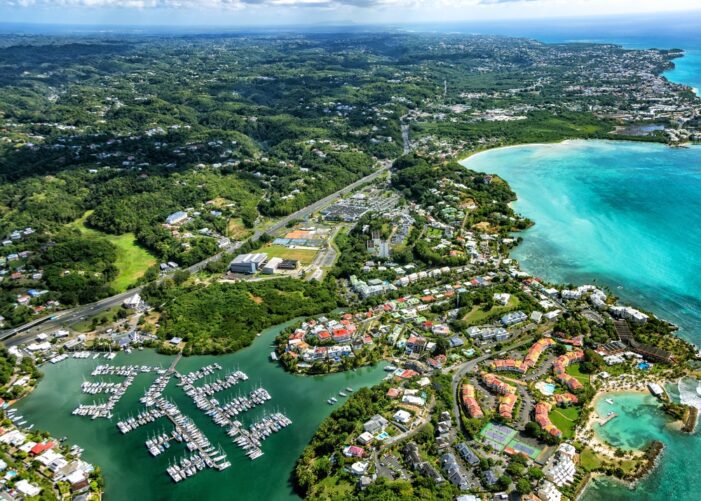Guadeloupe—an overseas department of France and European Union territory—offers a unique blend of Afro-Creole culture, French governance, island biodiversity, and investment incentives aligned with sustainable development. For African American investors seeking high-quality lifestyle, cultural resonance, and structured financial returns, Guadeloupe presents an intriguing and accessible opportunity.
- Cultural Identity & Heritage
Guadeloupe’s cultural tapestry is shaped by African, European (especially French), Indian, Middle Eastern, and Caribbean influences, creating a rich and diversified cultural mosaic. Key expressions include:
- Music and festivals: Biguine, gwo ka, cadence‑lypso, zouk, and the vibrant Carnival and Folkloric Festival Waldeck Rousseau bring Afro-Caribbean rhythms to life.
- Cuisine: Local dishes like colombo stew, dombré, accras, bokit sandwiches, and Ti-punch cocktails reflect African and Asian fusion influences.
- Literature and storytelling: Celebrated authors of Guadeloupean descent—such as Maryse Condé and Simone Schwarz‑Bart—highlight the island’s deep narrative heritage.
This Afro-Creole identity offers natural cultural alignment for African American investors interested in heritage tourism, performance arts, or diaspora-oriented creative ventures.
- Languages & Communication
French is the official language of Guadeloupe and used in government, education, and business. Guadeloupean Creole, a French-based creole, is widely spoken among residents and revered as a key marker of local identity. In practical terms, business communication is conducted in French, while Creole permeates cultural, familial, and creative expression.
For African American investors, fluency in French—or partnerships with bilingual advisors—is essential. However, English may suffice in tourism and international real estate sectors.
- Economic Foundations & Key Sectors
Tourism & Services
Guadeloupe’s economy (~€9–10 billion GDP) is anchored in tourism, services, light manufacturing, agriculture, and public administration—particularly as an EU region under French law. Tourism draws visitors from France and North America, with cruise ports in Pointe-à-Pitre and resorts across Grande‑Terre, Basse‑Terre, and Marie-Galante.
Agriculture, Rum & Light Industry
Historically anchored in sugarcane, Guadeloupe’s agriculture now includes bananas, cassava, root vegetables, cocoa, and rum production—with light industry in solar panels, cement, and furniture.
French Subsidies & Infrastructure
As an overseas French department, Guadeloupe benefits from national subsidies and infrastructure investment—often fueling economic modernization and social resilience after natural disasters.
- Investment Incentives & Real Estate Opportunities
Loi Girardin Tax Benefits
Guadeloupe is eligible for the Girardin investment incentive—a French fiscal program aimed at stimulating overseas economic development. Under Girardin industriel, investors may receive tax reductions up to 115–125% of their investment, typically in zero-dividend ventures supporting infrastructure or local industrial projects . In addition, real estate investment in designated zones can qualify for up to 40% tax write-offs via Girardin housing incentives.
Business & Employment Credits
Corporate projects that create jobs can qualify for equipment or employment premiums of 20–50% for industrial investment, or 8–20% for agricultural support, under French overseas aid frameworks.
Property & Rental Investment
Real estate in Guadeloupe offers strong rental potential and tax-favorable structures. Some long-term ownership can benefit from capital-gains exemptions under French law (especially for primary residences or long-held investments).
- Investment Opportunities for African American Investors
Heritage Tourism & Creative Ventures
There is room for culturally infused hospitality: boutique guesthouses, Afro-Creole restaurants, immersive festivals, or music and dance residencies rooted in Carnival, gwo ka, or local culinary tradition. Collaboration with diaspora and local artists can enrich authenticity and impact.
Real Estate Development & Rentals
English-speaking Caribbean properties—especially in Pointe-à-Pitre, Marie-Galante, or coastal Grande-Terre—offer vacation-rental or relocation prospects for North American visitors. Girardin housing incentives support rental or sustainable housing development.
Eco-innovation & Sustainable Agriculture
Projects combining ecotourism with gardens, cocoa or cassava-based agro-processing, or renewable energy (solar, biomass) fit policy aims. French subsidies and tropical climate research support sustainable ventures.
Franco-Caribbean Entrepreneurship & Services
Entrepreneurs may launch bilingual consultancy, Creole-language content/media studios, cultural event management, or wellness-oriented tourism packages targeting French and diaspora markets.
- Strategic Approach for African American Investors
- Clarify your objectives: Are you pursuing cultural impact, rental income, tax optimization, or heritage-driven enterprise?
- Secure French-language support: Partner with bilingual advisors experienced in Girardin incentives and local laws.
- Identify viable Girardin structures: Whether industrial infrastructure, housing, or agricultural ventures, ensure your plan aligns with local needs and French eligibility criteria.
- Partner locally: Collaborate with cultural associations, tourism boards, or French‑registered developers for authenticity and regulatory compliance.
- Embed Afro-Creole identity: Integrate language, music, food, and storytelling into branding and visitor experiences.
- Leverage EU status: As part of France/EU, Guadeloupe offers access to European standards, stability, and relative legal security.
- Outlook & Summary
Guadeloupe offers a rare blend: Afro‑Creole cultural richness, French legal frameworks, and EU economic support combined with tropical island biodiversity. While it lacks Citizenship-by-Investment options typical in independent Caribbean states, the financial incentives—especially Loi Girardin and investment premiums—create attractive tax-savvy entry points.
For African American investors interested in culture-led tourism, socially conscious real estate, creative media, or sustainable agri-tourism projects, Guadeloupe provides legal structure, linguistic accessibility (with French support), and a clear heritage identity to engage.
As the island continues integrating EU standards while preserving its cultural authenticity, investors can build ventures that honor identity, deliver impact, tap tourism demand, and work within French taxation and residency frameworks.


